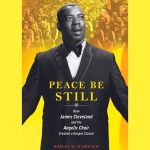In Honor of Andrae Crouch: A Couple of Great Books about Gospel Music
In early 2015, Andrae Crouch died. There’s room for a good biography of Crouch, and maybe someday we’ll have one (or perhaps one is in the works, unbeknownst to me). He brought gospel music into a new age, and stands at the fount of the genre that eventually grew into contemporary Christian music. There are plenty of great books about gospel music and Christian music, including, among others, Don Cusic’s Saved by Song: A History of Gospel and Christian Music (Mississippi), Anthony Heilbut’s The Fan Who Knew Too Much: Aretha Franklin, the Rise of the Soap Opera, Children of the Gospel Church, and Other Meditations (Knopf), and Robert M. Marovich’s A City Called Heaven: Chicago and the Birth of Gospel Music (Illinois). I’ll dedicate a future column to Marovich’s book. But this week’s column looks briefly at two books, and talks to their authors. One focuses on gospel music, and the other is the first to examine the role of the phonograph in the dissemination of black preaching.
Preaching on Wax
In the early half of the 20th century, many black preachers discovered a tool – the phonograph – that allowed them to reach beyond their congregants, to market their sermons to eager listeners willing to buy records of their preaching. Sermons on vinyl often sold in such quantities that some of them outsold the records of blues singers such as Bessie Smith and Ma Rainey. While many preachers traveled to cities like Chicago to seek record deals, record executives often sought out these individuals, traveling from church to church in the rural South in search of the next celebrity preacher.
Lerone A. Martin – a postdoctoral research fellow at the John C. Danforth Center on Religion and Politics at Washington University in Saint Louis – can identify with this desire for the spoken word. “I grew up in a home where we watched preachers on TV,” he says, “and my mom would always be ordering tapes of the sermons to listen to over and over again.” When Martin got to graduate school, he was intrigued enough by black preachers’ use of media that he focused on the Rev. James Gates of Atlanta his use of phonograph records to develop his celebrity and expand his audience.
In his new book, Preaching on Wax: The Phonograph and the Shaping of Modern African American Religion (NYU), Martin shifts the focus from one individual preacher to the technology of vinyl recordings. “I tried to make the phonograph the main character,” he says.
Martin points out how, in the years prior to WWII, especially in the rural South, a number of forces drove black preachers to records rather than the radio. For one, most folks could afford a phonograph, and you did not need electricity to run it. A radio, on the other hand, was expensive – they might cost around $50 – and many people could not afford them nor did they have the electricity to run them. In addition, most radio stations worried that they would lose revenue if advertisers found their products associated with black preachers. The phonograph and the records made by these clergy helped shaped modern African-American religion in significant ways.
Martin says that examining this preaching on wax “helps us to see that our own contemporary experience of religion, media, and commodification is not new.” A preacher such as T.D. Jakes, for example, uses television, film, books, and audio products not only to reach a wider congregation, but also to ground his authority as the leader of this larger flock. Also, Martin observes, preaching wax “helps us to think about celebrity and the way it bestows authority upon these religious leaders.” Anyone interested in the intersection of religion and music – and, in this case, politics and technology – will appreciate Martin’s book.
Nothing but Love in God’s Water
When he was 11 years old, Robert Darden’s parents gave him a Mahalia Jackson album for Christmas, and he played it over and over. Now director of the Black Gospel Music Restoration Project and associate professor of journalism, public relations, and new media at Baylor University, Darden says, “I’ve spent the last 54 years trying to replicate the thrill that listening to that album gave me.” He’s also sought to preserve the important American music he came to love. That mission culminates in his new book, Nothing but Love in God’s Water: Black Sacred Music from the Civil War to the Civil Rights Movement (Penn State).
Since the early ’80s, Darden has been both a scholar and evangelist of gospel music, seeking to preserve it through archival work and by writing its history. After seeing Andrae Crouch and the Disciples in concert in the early ’70s, Darden began interviewing gospel musicians when they came through Waco, TX, writing about them for the local paper. Billboard started covering gospel music in the ’80s, and the magazine named Darden its first gospel music editor, a position he held for 10 years. After he left Billboard, Darden became editor of the Wittenburg Door, a magazine satirizing the contemporary church, where he continued to write about gospel music.
Darden’s 2004 book, People Get Ready: A New History of Black Gospel Music (Continuum), tells the story of gospel music through both historical and musicological lenses. After covering the 2005 Grammy Awards and Kanye West’s hip-hop song, “Jesus Walks” – which West performed with classic gospel artists Mavis Staples and the Blind Boys of Alabama – Darden wrote an opinion piece in The New York Times called “Gospel’s Got the Blues.” In that article, he mourned the physical loss of gospel recordings and concluded, “It would be more than a cultural disaster to forever lose this music. It would be a sin.”
Now Darden says, “I had no idea I’d have such a reaction to that opinion piece, and I’ve been reacting to that gift ever since.” One way he reacted was to establish the Black Gospel Music Restoration Project at Baylor University in February 2005. He and his staff collect and digitize 45s and other materials that come to the archives. In the process, Darden made a startling discovery: “We’d receive these 45s of gospel songs or spirituals and flip them over to find civil rights songs on the B-side of the record.”
Darden has always been intrigued by what he calls the “double-voicedness” of the spirituals; although they appear to be about the freedom that heaven promises, they’re really about freedom from slavery and oppression in this world. In Nothing But Love in God’s Water, he writes about the use of songs about justice and spirituality from the Civil War to the civil rights movement. In a second volume, likely to be published later this year, Darden will take the story to 1968, when thousands occupied Resurrection City, the shantytown erected in Washington, D.C., to protest poverty in the wake of Martin Luther King Jr.’s death.
“What you can’t deny,” Darden says, “is that this music provided something that enabled black people to challenge the most powerful nation on the planet, armed only with love, justice, and song. It’s all there in those old spirituals, and those unstoppable, irresistible gospel songs.” Darden’s book comes at a very good time, when the presence of gospel music itself continues to grow larger and many writers join the conversation about its history and its impact.




